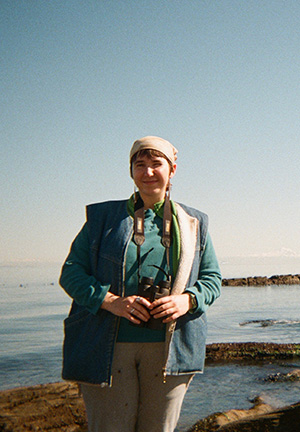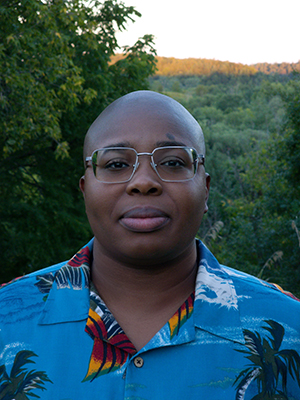A Place for Grief to Live: Camille Lendor interviews Meghan Reyda-Molnar

Past contributor Camille Lendor talks with Meghan Reyda-Molnar, whose poems “I Buried the Chickens in a Pit in My Backyard,” “Blue, Blue, Blue,” and “Eden” appear in our spring issue #226. They discuss the deconstruction of meaning, leaving room for nihilism, and how both oceanography and poetry are preoccupied with interconnection.
Read "Blue, Blue, Blue" here.
Meghan Reyda-Molnar is a queer white settler living on Lək̓ʷəŋən land (Victoria, BC), though they were raised on Treaty Six territory (Saskatoon, SK). They recently received their undergraduate degree in chemical oceanography from the University of Victoria. They will begin an MFA in poetry supervised by Matt Rader at UBCO this coming September. Their writing appears most recently in This Side of West, Dyke News, and The Warren Undergradute Review. Outside of their writing life they enjoy doing crossword puzzles, misidentifying birds, and trail running.
In “I Buried the Chickens in a Pit in My Backyard” and “Blue, Blue, Blue”; I noticed the way grief is juxtaposed with a pointed sense of physicality, a combination of the material and immaterial, within these poem’s lines. Since grief is a theme in both poems, was this combination intentional, or did it naturally pan out this way when you wrote the poems?
This combination was unintentional, and it’s possible that the reason these poems share it is because they were written very close together in time. I think that bringing grief into the physical plane speaks to the particular way I was experiencing grief in my life at this moment—experiencing it as a physical sickness. When one is experiencing the bodily discomfort of grief, maybe it becomes easier to describe the feeling by looking to objects, to one’s surroundings, the dirt, the light, as physical manifestations of what’s internal, rather than trying to come up with other words. It’s easy to let grief rule one’s mind with its question of why. My poems clearly wrestle with that question too. But maybe it can be refreshing to escape the brain for a second and try to describe the landscape of the grief that’s living in you, rather than probe why it exists. I think I was trying to balance those two urges, to outline and to question, without it being clear to me at the time that that was my goal.
When reading all three poems, I noticed the through lines that combine the three as a cohesive group are their endings, and the appositional, conversational cadence they share, which makes each ending effective and poignant. Still, with this poignancy and cadence of the verse, it felt as though the endings evoke a sense of tension with and deconstruction of meaning; specifically, meaning and grief in “I Buried the Chickens in a Pit in My Backyard” and “Blue, Blue, Blue” and meaning and nostalgia in “Eden.” Do you consider these poems to be explications of meaning in their own ways?
You’ve outlined the little dance that I do in these poems very well here. I think that in all three I am trying to state the facts plainly, secretly hoping to see the bigger picture, though I’m acting coy about it. So yes, maybe, trying to explain. Whether they are good or valid explanations is another question. I think, more so than explaining though, I am trying to come to acceptance, whether that includes understanding or not. In “I Buried the Chickens in a Pit in My Backyard” and “Blue, Blue, Blue” I’m trying to figure out a place for grief to live in me. In “Eden” it’s the overwhelming nostalgia that I need to build a home for. The tension comes from worrying I am not going to be able to pull it off. That’s where this deconstructing, appositional edge comes in—that if I’m unable to reach acceptance then maybe I’ll be able to live with my experiences in a nihilistic sense. I’m not a nihilist, so it’s not my preference. But my poems seem to leave room for that.
In your bio, you mentioned having a degree in chemical oceanography. Despite the fact that all three of your poems in this issue of The Malahat Review are set on land, do you find that what you know about oceanography impacts the way you write in an abstract sense, or are poetry and oceanography two entirely separate fields in your mind?
I find myself wanting to say that they exist entirely separate, but this is not true, even if it’s just in the sense that my poems come from the well of my life, and oceanography has been a large part of my life for the past few years. I haven’t written any poems that explicitly deal with topics in oceanography or chemistry, mostly because I’ve personally found it very difficult to combine the language of science with my poetic voice as it exists right now. Maybe I’ll feel differently in the future. I think that the way science exists to be concerned with compartmentalizing and objectivity and ultimately, understanding, can make it feel supremely at odds with poetry. But again, that feeling is not the end of my thinking—it seems to apply mostly to the western, colonial vision of what science is/should be. In other cultures, holistic thinking is more valued and, in the past, more people were generalists, I think. More scientists were also poets and philosophers. I know many scientists who are also great artists now, as well. Oceanography as a field is extremely interdisciplinary—combining physics, chemistry, biology, geology, atmospheric science, environmental policy, engineering—which is a large part of why I find it interesting enough to stick with. It is, in many ways, preoccupied with interconnection, as poetry is.
Some writers have the first few lines come to them in their head, while others have a specific ending in mind, and others have no idea what they’ll end up writing but come up with something anyway. When you write, what is your approach to the page, and does it change with each poem or stay largely the same?
I think that the approach to poetry which grants me poems that I like and can see myself working on further is always sort of the same, even though I have been trying to alter my writing practice a bit lately. I have always been a poet who writes only when they feel in the current of something, which means poems come sporadically for me, rather than with any sort of consistency. Recently, I took a class on poetry (Poetry 1 with Rob Taylor at SFU) which forced me to write poems weekly and I found that a challenge, though I really do like this idea of experimenting/practicing language on a regular basis, so that when inspiration strikes, the knives are already sharpened, there’s maybe less fumbling around and being scared about the thing being good. I never have a specific ending in mind, maybe I have a few lines to start at, or often it’s just a few words that are ringing. You feel that something is in there, and you have to tug carefully, like peeling a potato or an orange—trying to uncover what’s within while also trying to keep the spiral of the skin unbroken. And when you get to the end, you know it.
What is one piece of writing advice that has had a profound effect on the way you write?
I can’t really think of a good stand-alone quote to give, or a singular tidbit of a conversation to share. I think lots of the best writing advice I’ve received has come from my close friends who are also writers. Often, they can see what I’m trying to do and the direction I need to be pointed in, better than I can. For example, I really had no idea that my poetry is so driven by sound until a friend was helping me edit and asked me how or why I had written something, and all I could do was cite the music. To go further back, when I was a teenager in my first writing workshop at my local public library (shout out to the Sagehill Teen Writing Experience), dee Hobsbawn-Smith told me that I would have plenty of time for writing when I got older, and thus, to just focus on living for the time being. I think whether intentionally or not, I have followed that advice. My life is chronically full, which can often make it difficult to have space for a rigorous reading/writing practice, but which gives me so much to draw from when I do sit down. The rub is very much finding the balance. Doing enough to feel invigorated, but not too much that you lose the feeling. I’m about to enter a period of my life that is more focused on my poetry, which really excites me—I’ve spent the past few years slowly building my practice, and now I can stoke it with time.

Camille Lendor









